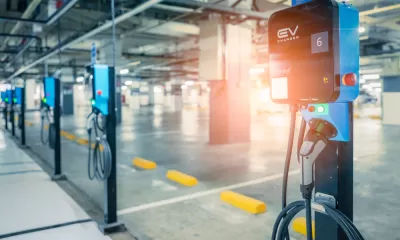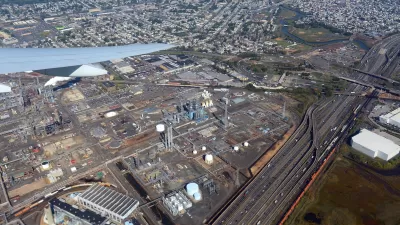While they emit less pollution, electric cars don’t solve many urgent issues like sprawl and fine particulate pollution.

A new analysis shows that even worldwide adoption of electric vehicles to replace gas-powered cars would not solve some major problems caused by auto-oriented infrastructure.
Writing in Bloomberg CityLab, Eric Roston explains that researchers surveyed roughly 400 papers to understand how the “substantial, ongoing investment” in physical and economic infrastructure that prioritizes cars harms public health and exacerbates climate change. “A comprehensive review published last month provides a litany of what the authors call ‘car harm,’ in estimated global totals of death, injury, disease and other miseries, over the course of automotive history.”
Meanwhile, electric cars don’t change underlying development patterns or how much space is allocated to cars. “Swapping engines for batteries isn’t changing how much cities pave themselves to accommodate cars, and or how cars kill people, the authors write. Although their tailpipes don’t spew carbon monoxide, they are often heavier than their internal-combustion counterparts, which means more fine-particle pollution from tires on highways.”
FULL STORY: EVs Can’t Fix a Global Epidemic of ‘Car Harm,’ Study Finds

Alabama: Trump Terminates Settlements for Black Communities Harmed By Raw Sewage
Trump deemed the landmark civil rights agreement “illegal DEI and environmental justice policy.”

Planetizen Federal Action Tracker
A weekly monitor of how Trump’s orders and actions are impacting planners and planning in America.

How Atlanta Built 7,000 Housing Units in 3 Years
The city’s comprehensive, neighborhood-focused housing strategy focuses on identifying properties and land that can be repurposed for housing and encouraging development in underserved neighborhoods.

In Both Crashes and Crime, Public Transportation is Far Safer than Driving
Contrary to popular assumptions, public transportation has far lower crash and crime rates than automobile travel. For safer communities, improve and encourage transit travel.

Report: Zoning Reforms Should Complement Nashville’s Ambitious Transit Plan
Without reform, restrictive zoning codes will limit the impact of the city’s planned transit expansion and could exclude some of the residents who depend on transit the most.

Judge Orders Release of Frozen IRA, IIJA Funding
The decision is a victory for environmental groups who charged that freezing funds for critical infrastructure and disaster response programs caused “real and irreparable harm” to communities.
Urban Design for Planners 1: Software Tools
This six-course series explores essential urban design concepts using open source software and equips planners with the tools they need to participate fully in the urban design process.
Planning for Universal Design
Learn the tools for implementing Universal Design in planning regulations.
Jessamine County Fiscal Court
Caltrans
Institute for Housing and Urban Development Studies (IHS)
City of Grandview
Harvard GSD Executive Education
Toledo-Lucas County Plan Commissions
Salt Lake City
NYU Wagner Graduate School of Public Service





























